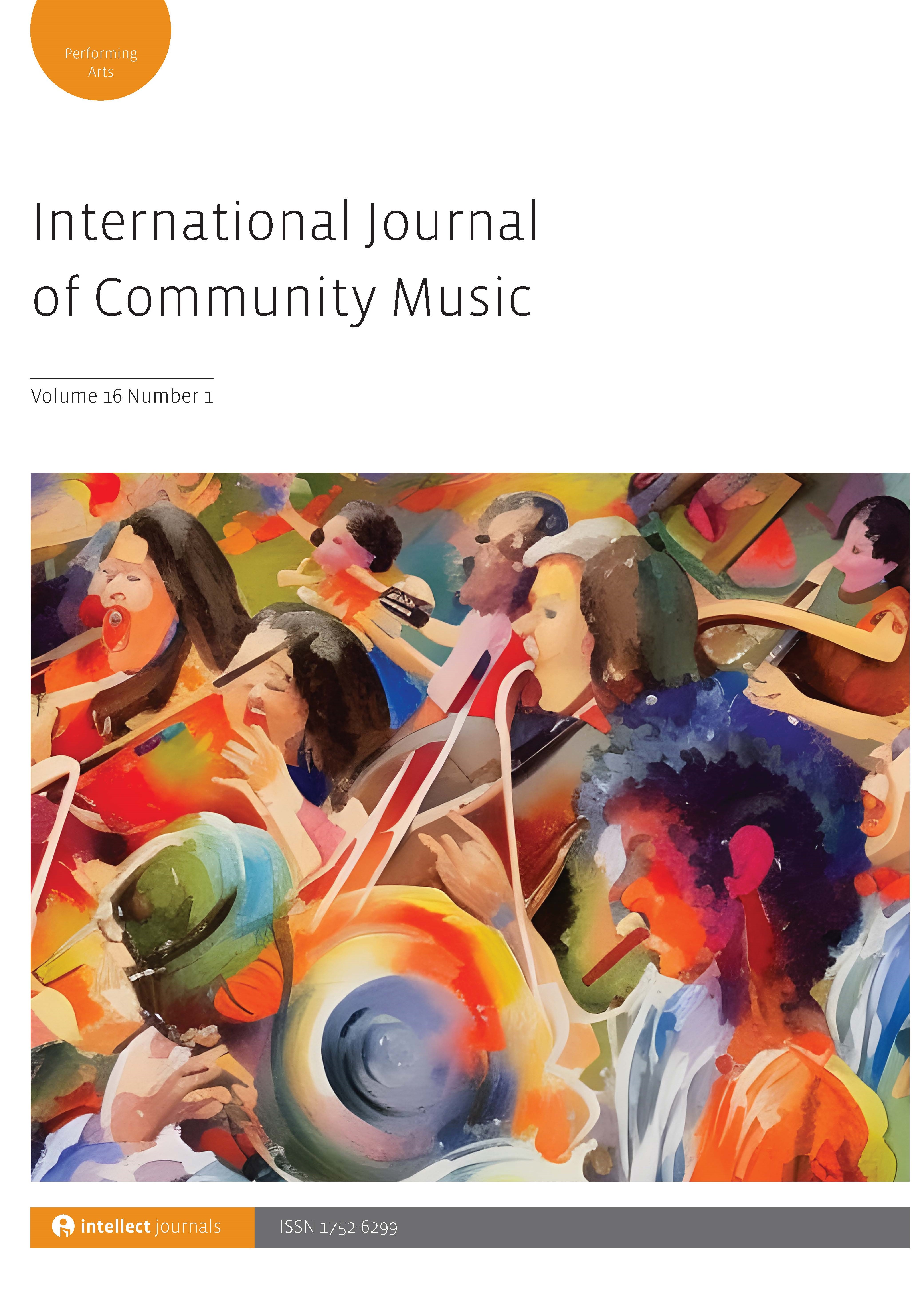- Home
- A-Z Publications
- International Journal of Community Music
- Previous Issues
- Volume 5, Issue 2, 2012
International Journal of Community Music - Volume 5, Issue 2, 2012
Volume 5, Issue 2, 2012
-
-
The Funky Mamas: Learning to create and perform music for young children within a community of practice
More LessThis article reports a case study examining the music learning and making of the Funky Mamas – five professional mother-musicians who create and perform music for young children at festivals, fairs, theatres and community events across Canada. Data were collected through interviews with the band members and field observations of rehearsals and live performances. Analysis involved the coding and sorting of data for correspondence to emergent themes and for themes suggested and informed by the theoretical framework of Etienne Wenger’s Communities of Practice (1998). The author draws from the Funky Mamas’ relating of experiences and perceptions to illustrate their processes of learning through practice, including: evolving forms of mutual engagement; understanding and tuning their enterprise; and developing repertoire, styles and discourses. Findings from this study inform implications for teaching and learning; the author suggests how music educators might support and enrich learning-through-practice proesses amongst their own students.
-
-
-
A family music project in the north of England: A study of the pedagogical methodologies employed and the outcomes achieved
More LessThis article examines learning outcomes in relation to the pedagogical methodologies employed in a community music project involving families. The research was designed with three stages. In the first stage case studies of existing family music projects were undertaken. In the second stage findings from the case studies were applied in the design of a new musical project for families, executed in two settings. The outcomes of the new project were discussed and consolidated at a symposium in the third stage. It was concluded that there was a direct relationship between the successful methodologies and social context, and a number of affecting factors were identified, including socio-economic status, previous access to music, and the perceived role of the family members in the project.
-
-
-
The legacy of Choral Director Robert Shaw: Beyond technique to music in communities
More LessThe article examines Choral Director Robert Shaw’s approach and explores whether these innovations constitute a lasting legacy for amateurs and community singers beyond the world of professional choral directors. After a brief biographical overview of Shaw’s contributions and achievements, the author outlines four specific innovations attributed to Shaw and his work with choruses all over the world. The author sang with Shaw for ten years and introduces her own personal notes from musical scores, as well as videos and Shaw’s Dear People letters to describe his preparation and warm up approaches, attention to the spiritual in music, use of metaphorical and imagistic language to teach choirs, and his explicit belief in the power of community in choral singing.
-
-
-
Perceived benefits of active engagement with making music in community settings
More LessAuthors: Susan Hallam, Andrea Creech, Maria Varvarigou and Hilary McQueenThis article focuses on the reported benefits of participation in music activities, identified by participants of the Music for Life Project. The participants engaged in weekly music activities offered in three locations: two centres in London and one in the North of England. Their responses were collected through questionnaires and focus group interviews. Music participants attributed improvements in quality of life to active engagement with music, and a wide range of cognitive, social, emotional and physical benefits were reported. This article offers an insight into what participants said about improved health, social interactions, emotional support and learning that occurred as a result of active involvement in music.
-
-
-
Health, masks and music: Narratives of empowerment in a South African community music therapy project based in a tuberculosis hospital
More LessThis article introduces the Music Therapy Community Clinic’s (MTCC) Music for Health Project based in a tuberculosis (TB) hospital in South Africa. The value of this community music therapy project is explored from various narrative frameworks pertaining to health and the TB disease. Initially viewed from a reductionist medical narrative with a primary focus on treatment of physical symptoms, music therapy offers patients a diversion from their illness, but is perhaps a luxury rather than an essential form of therapy. The project is then considered from a narrative framework of empowerment, placing TB as a disease that predominantly affects those who are disempowered through poverty, stigmatization and isolation. Three case studies explore how community music therapy serves to empower patients on individual and collective levels, and consider possibilities this may hold for influencing the health behaviour of patients. As TB is becoming a pertinent issue worldwide, the article may offer possibilities for the role of creative approaches in the care of TB patients.
-
-
-
Music as a tool for social transformation: A dedication to the life and work of Steve Dillon (20 March 1953–1 April 2012)
More LessThis article celebrates the life and work of Australian musician and educator Steve Dillon (20 March 1953–1 April 2012). It focuses on the most significant pedagogical and philosophical ideas that informed his community music practice, and illustrates these concepts with examples from his work with the Sweet Freedom, Accessible Interactions, DIScoveringABILITIES, jam2jam and One Laptop Per Child projects. In particular, the article focuses on Steve Dillon’s belief that music has profound transformative effects on people of all ages and cultures, and has the power to enable people to express themselves, build relationships and find their place in the world.
-
Volumes & issues
Most Read This Month


